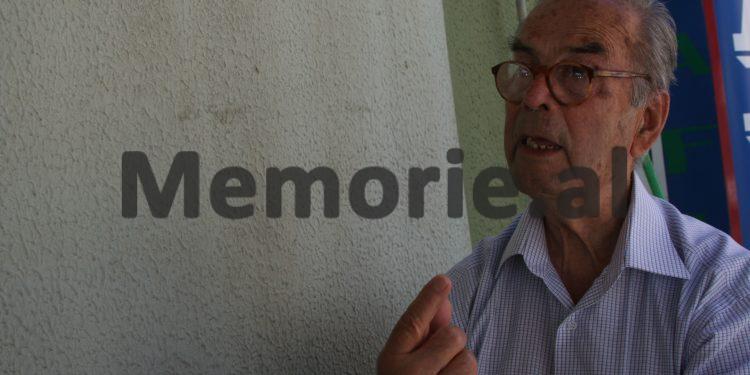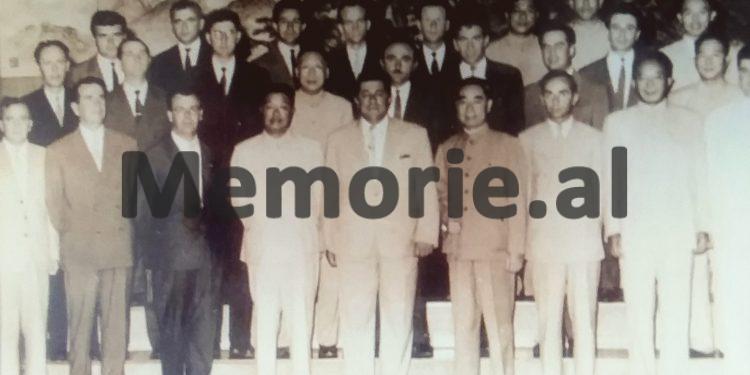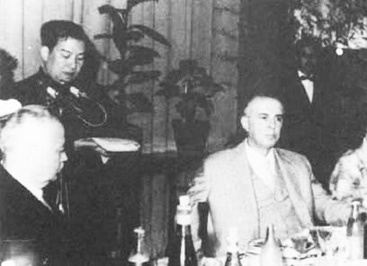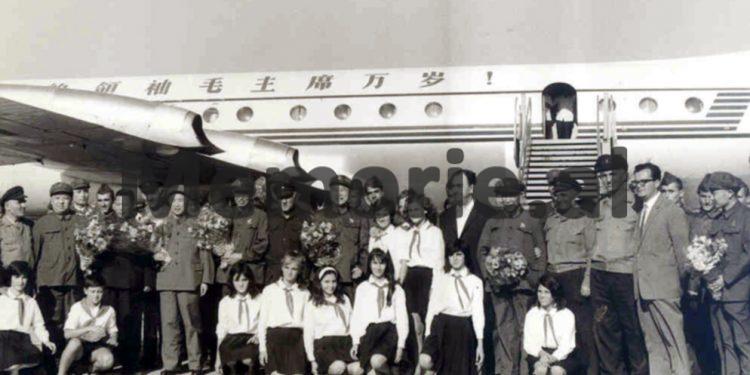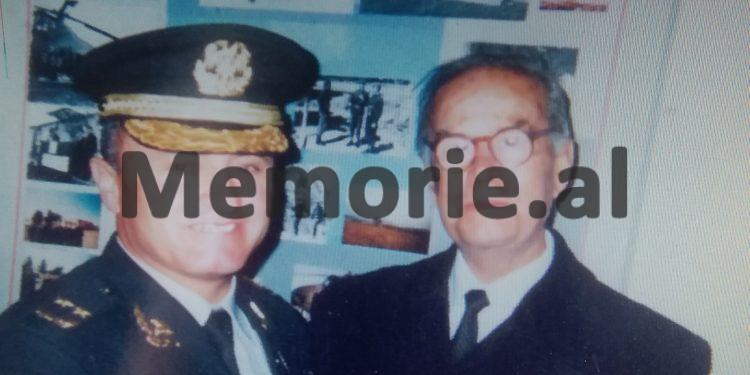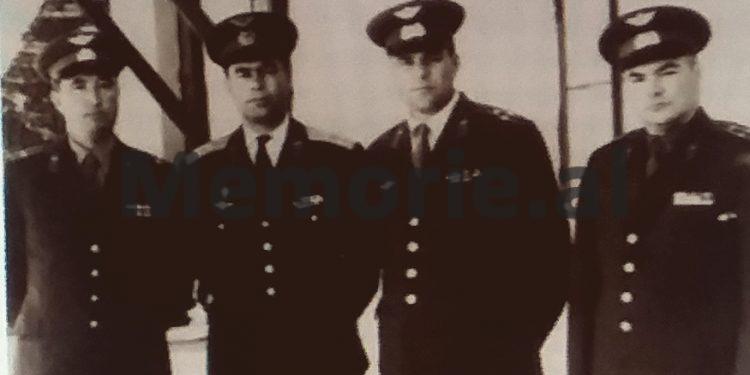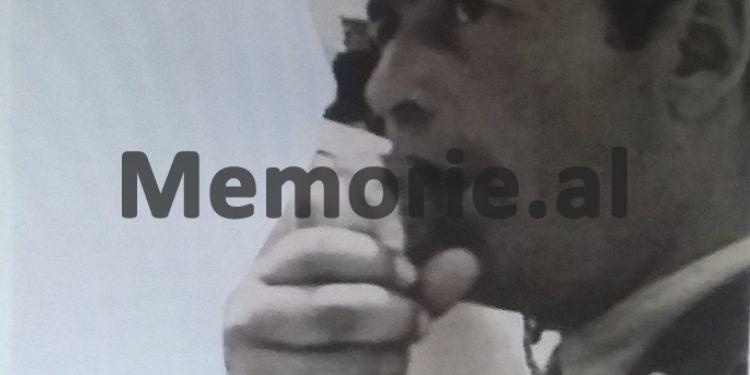Dashnor Kaloçi
Memorie.al/publikon the unknown story of Koço Kota, originally from the city of Korça, who after being educated at the University of Athens for Political Science, in 1912 returned to Albania, responding to the call of Ismail Qemali, who appointed him Secretary-General of the Ministry of Education. After the great support he gave to Ahmet Zogu for his return to power, in 1925 he appointed him to the post of Minister of Internal Affairs and then, as Prime Minister of Albania, functions which he performed with high loyalty to King Zog , whom he accompanied during his departure from Albania, in April 1939, after the fascist aggression of Benito Mussolini. The testimony of his granddaughter, Kristina Kote, about the placement of Koço Kota in Thessaloniki, where in 1945 three officers of the Albanian State Security, who with the help of the Greek communists, who then controlled a large part of Greece, kidnapped him forcibly put him in a locked car and brought to Tirana, to be later sentenced to the Special Court, with 30 years in prison. His tragic death in Burrell Prison and the subsequent persecution of the family of his brother, Ilia Kote, who not only had never been involved in politics, but he had been an ardent supporter of Fan Noli….
“My uncle Kostaqi, or Koço as we called him, in our family quickly left Korça and settled in Tirana, before 1920, because he was involved in politics. Unlike Koço, my father Ilia, who graduated in Istanbul with a degree in Law, not only did not get involved in politics, but he told Koço to give up politics. But Koço never listened to our father and he became involved in politics when he was young in the government of Ismail Qemali, where he was appointed Chief Secretary of the Ministry of Education. Although Koço worked and fought for a lifetime, for the good of Albania, since the Congress of Lushnja where he was elected Secretary and then, as Minister of World Affairs, and twice as Prime Minister of Albania, he was lucky tragic. After the end of the War, he left Athens, where he had settled after Zog’s departure, and settled in Thessaloniki, together with two of his companions, former high-ranking officials of the Monarchy. From the beginning of 1945, three State Security officers from Albania went to his house and met him, who reached there, assisted by the Greek communists who at that time controlled a large part of the territory of Greece, where Thessaloniki was included. They were removed as nationalists and lied to him, saying that he should return to Albania with them, as a coalition government would be formed, with the communists of Enver Hoxha. Although Koço did not believe their statements and refused to return, they forcibly took him in a locked car and brought him to Tirana, where they took him to the Special Court in March 1945. Unfortunately, Koço had his brother speak. and my father Ilias, who had told him not to get involved in politics. “After a life sentence in the Special Court, he died tragically in the dark cells of Burrell Prison.” This is how Kristina Kota remembers the story of her uncle, the former Prime Minister of Albania Koço Kota, who took an active part in Albanian politics at a very young age, in the Government of Ismail Qemali and later in the Congress of Lushnja where he was elected Senator. , to continue his long career as an MP, Minister of Interior, World Affairs and twice Prime Minister of Albania.
Continued from the previous issue
Mr. Ohrid, when was Enver Hoxha informed about the talks that your delegation was holding with the Minister of Defense and the Prime Minister of China, Chu En Lain?
The whole conversation between our delegation and the Chinese one led by Chu En Lai, which lasted about six hours, was shorthand by the two radios of the Ministry of Interior who had come with us and they urgently transmitted it to Enver Hoxha in Tirana. “After that meeting, the two radio operators immediately returned to Albania and only then did we understand why they had come to China as part of our delegation.”
How was the Chinese response to Beqiri Balluku and you, the other military, for not approving your demands?
Normally we were bombed by the Chinese side’s responses, as by that time we were used to getting everything we asked for free from China. But we were still calm because it did not depend on us.
Did Beqiri feel upset after those talks and how was his mood in those days?
Surprisingly, Beqiri was not as upset as in 1961 when Khrushchev spoke to us in Moscow, on the contrary he was calm as if nothing had happened, calling the Chinese response something normal. Perhaps this was due to the fact that he could never be responsible for the position taken by the Chinese side, especially since he had done his duty, transmitting their response to Tirana and removing everything from his shoulders.
What was happening with your delegation, did you discuss the conversations between you without the presence of the Chinese?
Yes, I definitely remember that on one of those days when we met for dinner with Beqir Balluku, he told us about the event of 1947 in Belgrade, when he was the Chief of Staff. At that time, Marshal Tito had pressured Beqiri to sign for the arrival of two military divisions in Albania, which he had not accepted. With this, Beqiri wanted to show us that history with us Albanians was in a way being repeated.
After the meeting with Chu En Lain, was it on the protocol agenda for your delegation to be received by Mao Zedong?
During that visit Mao Zedong was not scheduled to meet us, although we did some demarche to meet him. We were eager for Mao Zedong to receive us as he had for us every time we visited China. When we were in the corridors, we talked loudly to each other so that the Chinese could hear us, but again he did not receive us.
During those days, did you notice being watched by the Chinese?
The Chinese had a very strong surveillance, not only of us, but of all the foreigners visiting China. Ever since we arrived in China, our superiors have given us special orders so that we categorically do not have any business conversations in the rooms. So we had to have all the conversations in the hallways, yards and gardens.
After meeting Chu En Lain, how long did you stay in China?
After the meeting with the Chinese Prime Minister we stayed in China for another two weeks and the Chinese sent us to see and visit military units and plants of various types of weapons. Beqir Ballukun, the head of Chemistry, Dhori Gjoni and me, the Chinese sent us to see another uranium mine.
When did you return and on what itinerary did you travel to Tirana?
We returned to Albania a few days before the New Year and before departure our delegation was divided into three parts traveling separately. In the first group were: Beqir Balluku, Rrahman Parllaku, Hito Çako and Abdi Mati with their companions, in the second group were all the directors of the directorates and respective commanders of all types of weapons, while in the third group all experts. From Shanghai we came to Paris, where we were shocked and amazed by its beauties, although we had been recommended to visit only Pigalli. In Rome we joined Beqir Balluku and another and together we returned to Tirana. I wanted to say that in both France and Italy, our entire delegation was under strict security measures by the local police, in order to avoid any possible incident with any of the long-running Albanian political emigrants.
After your return to Albania, did the Chinese send weapons from what you asked for during your visit?
The Chinese continued to send different weapons to Albania than they had promised us and we had concluded bilateral agreements. I’m even telling you that the Chinese also gave us weapons that we had not asked for, telling us that we needed them very much. The Chinese have been very correct with us Albanians throughout the period of mutual friendship. Although in recent years relations between the two countries had cooled, they continued to send various weapons to Albania for free, until 1977 when we finally broke up with them.
Do we know any exact figures for the military aid that the Chinese gave us until 1977 when Albania broke off relations with them?
In 1977 when we broke up with China, the Chinese told us that the military aid they had given us for free was 13 billion yuan (almost equal to $ 13 billion) and that is more than credible because the Chinese for whatever they sent us, they even sent us the bill from behind.
But why did they do this when those aids were free?
This question was also asked by Enver Hoxha to the Chinese Prime Minister, Chu En Lait in 1965 in Tirana, saying: “We are almost an army, why do you send us the bill when you bring us the steamers with free aid?” And Chu En Lai replied, “So that the generations to come will know how much friendship we two peoples have had.
What happened to the members of that delegation in 1974-75 when the coup against the senior military took place?
This is a very interesting thing, because all of us members of that delegation that were in China at the time were all hit. Apart from Beqir Balluku and Hito Çako who were shot, others either ended up in prison or were interned. One or two people escaped having milder consequences such as dismissal or expulsion from the Party. I said that it is interesting the blow that we former members of that delegation suffered, because one of the main accusations that was made against all of us at that time, was why we had not reported in Tirana about what Chu En Lai had told us. This accusation was completely absurd, because it was not up to us to inform Tirana, especially when it was done by Beqir Balluku, who had a functional duty to inform about the talks that took place there.
How did the attack on you start and when were you arrested?
The attack on me started in 1975 when I was released at the age of 49, giving me an old-age pension, and that thing continued in 1978 when I was no longer elected a member of the People’s Assembly. While my arrest took place on October 16, 1980 and together with me were arrested a group which included: Shyqëri Këllezi, pensioner, former member of the Central Committee, Ali Kubati, Director of Trade for Tirana (former Deputy Chairman of the Executive Committee of Tirana) his brother, Ibrahim Kubati, forest engineer, Dhimitër (Lola) Mano, vice-president of the Albanian Hunters Association and Sabri Pilkati, former Chairman of the Executive Committee of Tirana.
What was your relationship with each other and what were you accused of?
We had no work or business relationship with each other. The only connection was that I had and have married the sister of Ali Kubati, while Lola Mano, had married the sister of Lym Keta, our friend. At that time Sabri Pilkati was interned with his family in Buz i Tepelena. But we were called a group, because if it was a group, according to the criminal code of that time, you would be punished with a lot. Among the accusations leveled at us as a hostile group was that we allegedly wanted to violently overthrow popular power and agitation and propaganda. Our arrest at that time caused a great commotion in Tirana and many cadres panicked, waiting to see who had the turn to be arrested.
You personally, what were they accused of?
The first accusation was what I said above, why I had not informed about the conversation we had with Chu En Lain in 1971, calling me a member of Beqir Balluku’s group who had the task of bombing the Leadership Bloc in Tirana and other absurdities of this nature. I was also accused of agitation and propaganda. But as the first accusation of terrorism and the violent overthrow of popular power fell, we were divided into two groups. In one I was with Shyqri and Ali Kubati, while in the other, Lola Mano, Sabri Pilkati and Ibrahim Kubati.
How did you escape that accusation?
At the time we were arrested, during a meeting, Enver Hoxha told Feçor Shehu: “The people love the leadership, because nothing has happened to us with the members of the Politburo who are constantly in contact and between the people. “As the First Secretary of the Central Committee of the ALP, there has been no problematic case.” Tirana and many cadres panicked waiting for who had the turn to be arrested, this was understood by the top leadership and we escaped from that serious accusation.
What were you asked about during the investigation?
Surprisingly, during the investigation, more precisely in January 1981, I was asked about Mehmet Shehu, who was still the Prime Minister of Albania. This was quite unusual, as then the investigator had an unwritten law, which categorically could not ask about the three main figures of the state: Enver, Mehmet and Hysni Kapo. But in my case this was violated and they wanted to know my opinion on many things about Mehmet, on the thesis of the Defense Council that he had drafted since 1969-‘70. They also asked me what the other senior members of the Army thought about the thesis of the Defense Council that Mehmeti had drafted and reported to the Politburo. All those questions were very irritating and incredibly provocative.
How did you respond?
Of course, I gave positive considerations to Mehmet, as it would be suicide for me if I spoke differently about the prime minister of the country who was still in office. But out of curiosity I am telling you one thing that still lingers in my mind to this day from that period of investigation. When I finished the investigation and returned to the cell, I told my cellmate about what I had been asked. That person whom I did not know at all at the time was a provocateur and an old ordinary prisoner who had put the apostates in a cell with me. When I explained to him that he had been asked about Mehmet, he told me: “I had a dream, as if one of the top leaders had died and I always have dreams.” I objected by telling him that Enver and Mehmeti were like apples (because this was what Llambi Peçini had told me before I was arrested) and I said: “maybe Haxhi Lleshi”. But he said to me: “No Haxhi Lleshi, a higher and more important person than him” and postponed the conversation for me to mention Mehmet. This conversation I had with him, I remembered in Burrel prison on December 18, 1981, when Mehmet Shehu’s suicide was communicated, and even to this day I have not understood the words of the provocateur that had put me in my cell. Memorie.al




